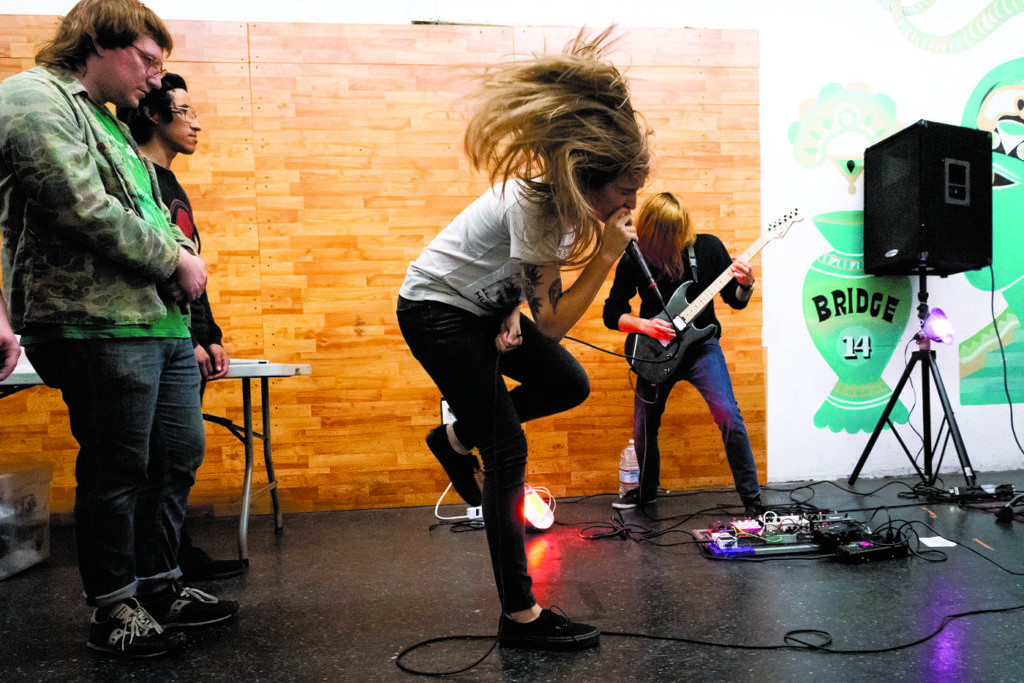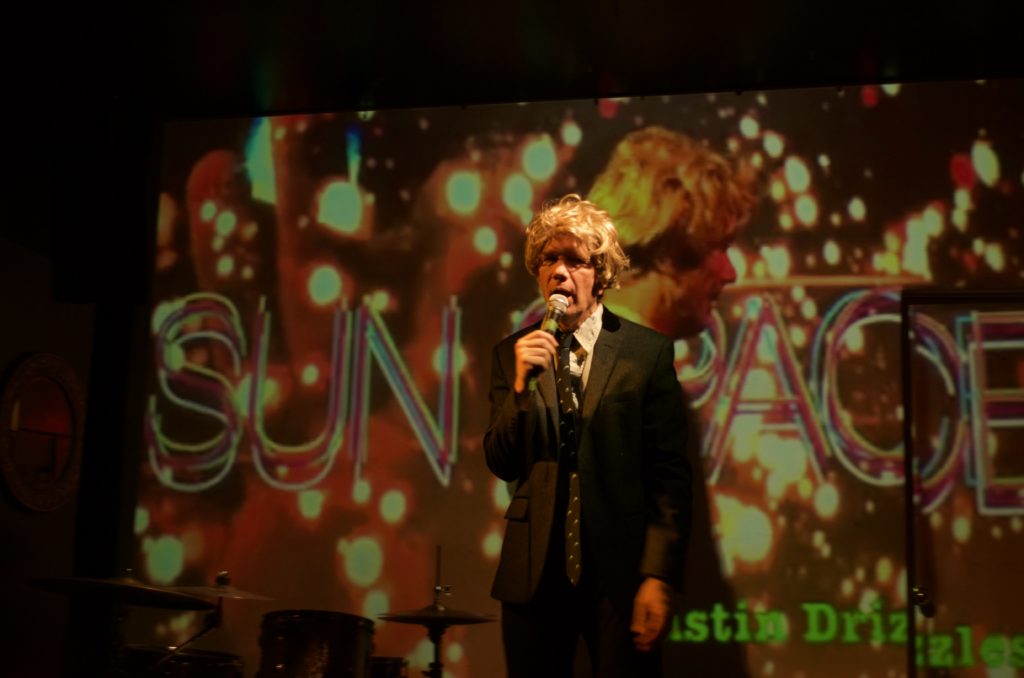
Running a D.I.Y. space in Los Angeles was a Herculean task even before COVID-19: Community-based venues perpetually have to make hard choices when it comes to rent increases, competition from behemoth promoters, and license and permitting requirements.
But this year, as public gathering spaces around the world were forced to close to help stop the spread of COVID-19, already-struggling D.I.Y. spaces were among those hit the hardest. We caught up with three D.I.Y. spaces about how they’re finding creative ways to survive, at a time when community is more important than ever.
The Smell: 247 S. Main Street, Los Angeles, CA 90012
Jim Smith first opened The Smell in North Hollywood in 1998, partly as a response to the closure of former D.I.Y. spaces like Jabberjaw. He relocated downtown in 1999 after his rent increased following the development of the North Hollywood Arts District. In the years that followed, the drug-and-alcohol-free venue became ground zero for one of the most exciting scenes in punk music. Its shows, which rarely cost more than $5 to attend, helped to launch the careers of bands like No Age, Mika Miko, Abe Vigoda, Silver Daggers, HEALTH, Together Pangea, and Captain Ahab. More recently, punk bands like Surf Curse and French Vanilla have carried the torch for experimental music at The Smell.
In May of 2016, Smith’s longtime landlord served him a demolition notice, sending waves of shock through Southern California’s punk scene. Although the panic turned out to be premature — the landlord has not yet acted on demolition plans — many in the community have for years shared the fear that The Smell is operating on borrowed time. The pandemic has only made that fear more real. After losing money from shows that were cancelled beginning in March, Smith told his landlord he could no longer pay rent — and so far, his landlord hasn’t hassled him about it. But Smith worries about what will happen in the months to come, with no end to the virus in sight and little relief from L.A.’s city government, save for an eviction moratorium set to expire soon. “I don’t know what’s going to happen if things get back to normal. I kind of find it hard to believe that a year from now, everybody reopens, and the landlords say ‘Well, you all owe back rent. Pay up,’” Smith says. “That could lead to a whole other economic downturn… Something needs to be done that addresses both renters and people that are paying mortgages that aren’t getting any income at the moment.”
But for the time being, Smith is optimistic that The Smell might come out of this with even more community support than before. “I’m hoping that when we do come out at the other end there will be a real hunger to go back in appreciation of what people have missed,” he says. “Maybe it’ll inspire more interest in these venues and what we offer.” — Additional reporting by Suzette Aguirre

Sun Space: 9683 Sunland Blvd, Shadow Hills, CA 91040
It’s a Tuesday night in Sunland, long before the quarantine started and the whole word began to shutter. Noel Rhodes is belting out a mutated torch song while wearing a fantastical papier-mache monster mask of his own creation. His son, Gaia, 30, plays electronic soundscapes and sputtering beats on his computer in front of a crowd of 20 or so local teenagers plus a few old timers.
The event is called Unusual Tuesdays and it takes place every week at Sun Space, a D.I.Y. music and arts venue tucked into a strip mall, between a medical transport business and a Pilates studio. The curated open mic night features local musicians, artists, poets, comedians, comic book authors, and even, occasionally, a paleontologist like Andrew Ellis, who gave a lecture on early dinosaurs last spring. It’s one of the best, and wildest events in town — on a Tuesday, or any day of the week.
In addition to Unusual Tuesdays, Sun Space’s calendar is full of shows put on by local punk bands, dance music DJs, and even local heroes like Mike Watt, formerly of the Minutemen, and Joe Baiza of Saccharine Trust. Noel and Gaia first put on Unusual Tuesdays after-hours at Hillbilly Hip, an eccentric thrift store in Topanga. Seeking a space of their own after the store closed, Noel found a vacant storefront in a strip mall in Sunland, which just so happened to be close to where Gaia was living at the time. “Sunland was just a lot more affordable to rent than other places in L.A., and it’s quiet,” said Noel, who pays rent on the space on sales from tickets alone, which rarely exceed $10 each. “And there’s lots of parking.”
We’re just kind of in a holding pattern. I don’t know what’s going to happen. There’s so much unknown.”
Noel Gaia
Van Shydner, the lead singer and songwriter of a band called Jody, has been coming to Sun Space from her home in Van Nuys ever since her former hangout, legendary D.I.Y. space Pehrspace, was evicted from its Historic Filipinotown strip mall to make way for a yoga studio in 2016. “It’s kind of like a mish mosh of a family run business and a D.I.Y. space,” Shydner said of Sun Space. “I can do whatever I want here. It feels like a creative incubator.”
Since the city’s stay-at-home orders were put in place in March, Noel has kept Unusual Tuesday’s going by performing by himself in the space and live streaming the performance onto platforms including Twitch.
“That’s the one thing I try to keep doing no matter what happens,” Noel said. “Gotta keep the Tuesdays going.”
Noel asks former participants to send in videos of themselves performing in their homes, and he’s added a feature where audience members can call into the live stream and chat with one of the characters that he plays. While the streaming sessions have helped maintain a sense of community from afar, they’re not likely to bring in revenue for a venue that was — even before the quarantine — on shaky financial ground. “I really don’t know what the future holds at all. We haven’t brought any money in,” Noel said. “We’re just kind of in a holding pattern. I don’t know what’s going to happen. There’s so much unknown.”
Noel said Sun Space’s landlord isn’t hassling him for rent, in the interest of preventing the space from having to close. But the rent hasn’t been forgiven. They’ll still have to pay back rent, eventually. If and when he’s able to reopen, he hopes to turn it into a kind of collective studio for artists to use, one at a time, if that’s possible under the public health orders, which have forced him to rethink the function of art spaces. “I don’t think that people will want to go into a really tiny space after this is over. It’s going to be different that’s for sure,” he said. “I’m very much in a state of uncertainty. But I tend to be a very optimistic person.” He adds, “There’s a lot of energy around the place. So that counts for a lot.”
Bridgetown D.I.Y.: 1421 Valinda Ave, La Puente, CA, 91744
It’s a late summer night deep in the San Gabriel Valley. The words “quarantine” and “pandemic” are still months away from entering the minute-by-minute torrent of horrible news headlines. And live music is still something we all took for granted. Hardcore screamo band Nuvolascura are blasting through an ear-pummelling set, limbs, instruments, and chords flying through the air.
Nestled between a water store and a Zumba studio on the border of La Puente and unincorporated Valinda, Bridgetown D.I.Y. acts as a space for both local bands and touring acts alike — the punk outfit Downtown Boys and the trans-feminist hardcore band G.L.O.S.S., to name a few — to play to for all-ages crowds. Like the bands they typically book, Bridgetown is grounded in its political convictions. The space is run by a volunteer collective — rather than a single owner — which organizes community workshops in areas such as self-defense, political organizing, and even baile folklorico.
“Bridgetown definitely has roots in anarchism, but we’re not evangelizing,” said Erica Estelle, a member of Bridgetown’s organizing committee, and the nicest person in the world until she gets on stage as the lead screamer of the hardcore band Nuvolascura.
Bridgetown is a safe and sober space, which means drugs and alcohol are not permitted, nor is discrimination of any kind. “A lot of us recognize the correlation between drugs and alcohol and violence,” said Estelle. But the ban also serves a practical reason: “It’s also so we don’t get shut down.”
Cameron Anarres, who was a part of the committee that established Bridgetown in 2013, hopes to secure enough funding so that there’s no pressure to hold events all the time. “We want to develop the space as a neighborhood center and to have events rooted in the community,” he said. Trips to Che Cafe, the D.I.Y. space on the UC San Diego campus, and Hyde Park Half, a now shuttered D.I.Y. Space on the West Side of L.A., provided Anarres with a template for community organizing.
“There’s an implicit value in having places that are non-commercial. That’s where these politics take route in people, even if they aren’t explicitly anarchist or communist,” he said. “We do what we can do to support our region. But we don’t want to be the only D.I.Y. space like this in L.A.”
When the stay-at-home orders were enacted, Estelle was looking forward to the spring and summer, when more bands were set to tour, bringing in some extra money for Bridgetown. She and other organizers had hoped to not only put the revenue towards paying rent, but also toward hosting community workshops and classes.
Since the beginning of the year, Bridgetown has been mostly substituting off a $5,000 grant from Vans, the skateboarding apparel company, but that grant has dwindled significantly to only $1,000. With little money left, Bridgetown has temporarily put its venue-based aspirations on hold to fundraise for a more urgent cause: distributing masks and hand sanitizer to people.
“It’s important for us to be there for the community in this time, more than just to provide shows,” Estelle said.
“Even though we’re shut down, we’re still going to do what we were founded to do. Right now we have to focus on doing mutual aid. Whatever happens happens I guess.”
This article appears in Vol. 2, Issue 2 of The LAnd. Click here to pre-order your copy.